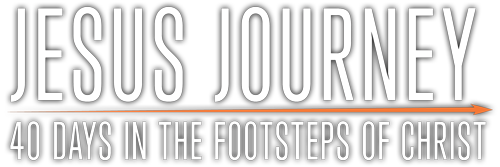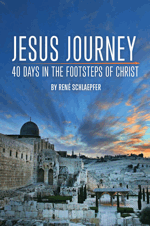Day 21
Decision Time
Read John 6:28–40; 66–69
Our group gathers on the ridge of Mount Carmel to see the breathtaking view 1,800 feet down into the Jezreel Valley. We try to imagine the scene that took place here nearly three millennia ago.
It was on this mountain that Elijah had his famous showdown with the priests of Baal (1 Kings 18).
Elijah is quite a dramatic and charismatic figure in the Old Testament, daring, sarcastic, emotional — and divisive.
In fact, that’s his primary mission. Probably his best-known statement is in 1 Kings 18:21:
“How much longer will you waver, hobbling between two opinions? If the Lord is God, follow him! But if Baal is God, then follow him!” NLT
He’s saying, It’s decision time.
This is what prophets do: Call people back to God. Challenge them to make a choice. Left to ourselves, most of us “waver, hobbling between two opinions.”
I know I do.
Jesus said that John the Baptist fulfilled the role of Elijah for his generation (Matthew 17:11–12, Luke 7:26–27). Like Elijah, John is piercing, emotional, powerful, and is calling people to a choice: “Repent of your sins and turn to God, for the Kingdom of Heaven is near.”
(Matthew 3:2 NLT). It’s decision time again.
Then it’s Christ’s turn to point at the fork in the road. With increasing frequency as his ministry nears its conclusion, he tells people it’s time to choose.
FOR JESUS, IT’S ALWAYS PERSONAL
Look how often Jesus challenges individuals to make a choice:
“Who do you say I am?’ Matthew 16:15; Mark 8:27; Luke 9:20
“I am the resurrection and the life… Do you believe this?” John 11:25–26
“Do you believe that I am able to do this?” Matthew 9:29
And when some of his followers begin to leave, he asks his closest disciples, “What about you? Do you want to leave too?”
You might sit inside a church with lots of other worshippers, or you might sit in a classroom with an atheist teacher, or you might sit in a break room eating hummus with rat-racing coworkers, but Jesus won’t ask you about what they believe. He’ll say: What about you? Do you believe this?
If I had x-ray vision of everyone’s soul at those moments of choice, I suspect I’d see this: A lot of us don’t want to have to answer that question. It’s awkward. We want to say we believe in Jesus — and everything else, too. We don’t want to seem to be putting down anyone’s beliefs. We actually prefer to “waver between two opinions.”
But at some point, indecision, as Elijah said on this mountain, hobbles us. Conviction produces forward momentum.
If Jesus is God, then follow him. If the way of the world is right, if pleasure and profit is what it’s all about, then follow that.
Choose whom you will serve.
THE POWER OF A SLIGHT SHIFT
There’s a famous mountain ridge in Switzerland that forms the line between continental watersheds.
On top of the ridge there’s an old hotel, and next to the hotel there’s a stable, and on the stable there’s a sloping roof. When a drop of rain falls on one side of the roof, it goes into the gutter, down a spout, into a brook, which leads to a waterfall, which goes to a river, and eventually that drop of water ends up in the Mediterranean Sea. If a drop falls on the other side, it ends up in the Atlantic Ocean. One-eighth of an inch difference on either side of the roofline, and the drops end up oceans apart.
This the power of choice: One small decision today can eventually make a difference in your life the size of a continent.
And if you’re thinking, I’d love to make a choice, but my faith’s a little shaky— just look at the responses Jesus gets to some of his challenges:
Simon Peter answered him, “Lord, to whom would we go? You have the words of eternal life.” John 6:68
I love Peter’s response, I really do. It’s almost like he’s saying, “You know, we’ve thought about it — I don’t want to lie to you, Jesus. You’re not always easy to live with. You’re always telling these riddles. We don’t always get you. But — where else are we going to go that’s better?”
Faith is hard sometimes. But consider the alternatives.
Peter and the other disciples still had questions. You see them come up throughout Christ’s long march to the cross. But they chose to see if some of those questions would be answered as they followed — instead of as they stayed on the sidelines.
Peter finally says:
“We have come to believe and know that you are the Christ, the Son of the living God.” John 6:69 WEB
“Come to believe and know.” Interesting progression there.
They followed him first. They watched and listened and observed and served. And then they came to believe. And, later, know.They developed faith in Jesus because of what they had seen and heard — and this eventually resulted in an intellectual conviction.
I BELIEVE; HELP MY UNBELIEF
After church one day, someone confessed to me, “René, I am an unbeliever.”
I said, “Define that for me.” And he answered, “Well, I feel like I do believe in Jesus, but I also have all these doubts.”
I turned to a verse in Mark where a man says to Jesus, “I do believe; help my unbelief!”
(Mark 9:24). And Jesus commends him for his faith. I asked the man in front of me, “Can you pray that prayer? ‘Lord, I believe — but help me in my unbelief?’” He said, “That describes me exactly!” I told him, “Then you have the faith that Jesus commended!” Because that’s real life faith right there.
“I believe — but I have questions.”
Jesus says, “Great, follow me. You’re just the kind of person I’m looking for.”
Faith isn’t about absolute certainty. It’s about believing something’s worth the risk. As John Lennox, a professor of mathematics at Oxford University and a Christian, says, “Pure proof is only found in mathematics. In all other fields of knowledge, it’s about the weight of the evidence.” If you wait for absolute certainty, you’ll find yourself suffering from paralysis by analysis.
Maybe you hear echoes of Elijah today. “How long will you waver between two opinions?”
Sooner or later, it’s decision time.
Ponder
Do you tend to be decisive or indecisive? How has this tendency impacted the practice of your faith? In what area of your life do you need to “stop wavering between two opinions”?

 Buy Jesus Journey at Amazon.com
Buy Jesus Journey at Amazon.com